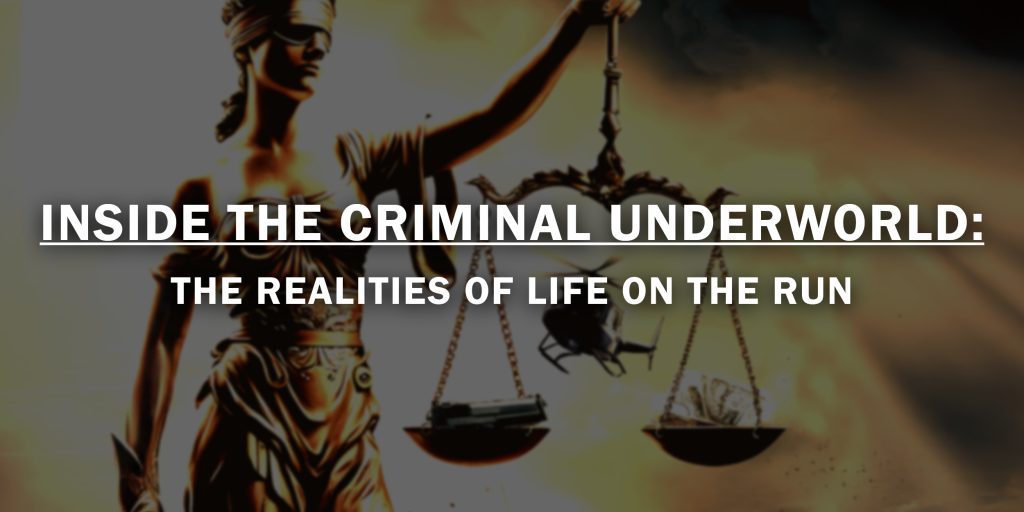
The depiction of exciting chases, betrayals, and high-stakes adventures is frequently what makes crime fiction so captivating. However, beneath the gripping suspense comes a sobering truth: being on the run is not glamorous at all. Survival in the criminal underworld is a never-ending battle for those who live there, requiring slyness, flexibility, and an unwavering will to stay ahead of the authorities. Terry Wilcock’s Divine Intervention delves into this shadowy world through the eyes of Jerry Divine, a fugitive who embodies the precarious existence of a life on the run. This blog explores the raw truths of this perilous lifestyle, drawing from the novel’s themes and real-world parallels.
The Constant Threat of Discovery
For a fugitive, every moment is tinged with the fear of capture. Whether hiding in plain sight or Navigating distant hideouts, the constant fear of being caught by the police or, worse, other criminals, fosters a tense atmosphere. Jerry Divine in Divine Intervention becomes one of Britain’s most wanted men after a botched heroin deal leads him to escape to the Costa del Sol.
In order to secure the resources they need to survive, fugitives in the real world have to carefully balance blending in and keeping a low profile. Burner phones, bribery, and fake identities are all commonplace, yet every interaction carries some danger. A small error, such as a recognized face or a verbal blunder, can result in capture.
Trust: A Fragile Commodity
Alliances are ephemeral in the criminal underworld, and treachery frequently originates from the most unlikely places. Although trust is a scarce and delicate resource, fugitives must rely on others to get them through their dangerous voyage. This dynamic is eloquently demonstrated in Jerry Divine’s story as he navigates a perilous web of allies, foes, and opportunists while being aware that any one of them could turn against him for his own benefit.
Trust is just as difficult for actual fugitives. There are two sides to relying on a close-knit set of associates. These relationships raise the risk of exposure even while they could offer crucial assistance. There are several accounts of fugitives being duped by confidants, underscoring the delicate nature of these connections.
The Psychological Toll
Living on the run takes an immense psychological toll. The constant fear of being caught, combined with isolation from loved ones, can erode even the strongest resolve. For Jerry Divine, loyalty to his family remains a driving force, but his separation from them exacerbates his internal struggles.
Real-world parallels are striking. Fugitives often grapple with feelings of guilt, paranoia, and loneliness. The necessity of cutting ties with family and friends leaves them emotionally adrift, while the stress of maintaining their cover can lead to physical and mental exhaustion. This relentless strain underscores the grim reality of a life that offers little solace or stability.
The Double-Edged Sword of Survival
The criminal underworld demands resourcefulness and fast thinking to survive. Every choice, from hiding from surveillance to protecting safe homes, is a calculated risk. Jerry Divine’s ability to outsmart his pursuers and use instinct and street smarts to survive in a world where one mistake could spell disaster is what distinguishes his trip.
In order to stay ahead, real-life fugitives frequently use comparable tactics, relying on their understanding of police enforcement techniques. On the other hand, this game of cat and mouse cannot be sustained over time. With the advent of worldwide databases and facial recognition technologies, fugitives now have a harder time avoiding detection.
The Role of Dark Humor
One of the most compelling aspects of Divine Intervention is its use of dark humor to offset the grim realities of Jerry’s life on the run. This element provides a sense of humanity and relatability, reminding readers that even in the direst circumstances, moments of levity can emerge.
In the real world, humor often serves as a coping mechanism for those living under constant stress. Criminals on the run may find irony in their predicaments or use humor to mask fear and uncertainty. This blend of tension and wit adds depth to the narrative, reflecting the complex emotions that define the fugitive experience.
Lessons from Fiction and Reality
Divine Intervention offers readers more than just a gripping crime thriller—it provides a window into the harsh realities of life on the run. Through Jerry Divine’s story, Terry Wilcock explores themes of loyalty, survival, and the moral ambiguities of the criminal underworld.
For those intrigued by the lifestyle depicted in the novel, it is essential to recognize that the real-world counterpart is far less romanticized. While fiction allows us to vicariously experience the adrenaline-fueled world of fugitives, reality paints a grimmer picture one of fear, betrayal, and the relentless pursuit of survival.
Conclusion
Being on the run is a dangerous life that necessitates ongoing attention to detail, flexibility, and the capacity to make difficult decisions. Jerry Divine’s journey in Divine Intervention encapsulates this way of life, fusing humor, tension, and unfiltered emotion to produce a compelling narrative.
Terry Wilcock believes that the novel’s authenticity comes from his personal views and experiences, providing a unique window into the complexity of the criminal underworld. The fugitive’s life, whether actual or fictional, serves as both a vivid reminder of the costly price of living above the law and a monument to the human spirit’s tenacity.
